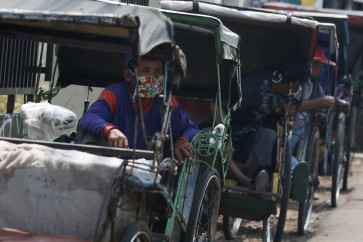Popular Reads
Top Results
Can't find what you're looking for?
View all search resultsPopular Reads
Top Results
Can't find what you're looking for?
View all search resultsInformal workers in Southeast Asia: Resourceless, yet resourceful
The pandemic has spurred a collective movement among the region's informal workers, who are striving to gain formal recognition and eligibility for social protection programs to secure their futures
Change text size
Gift Premium Articles
to Anyone
I
nformal workers dominate the region’s labor market in both urban and rural areas. More than half of the workforce in most Southeast Asian countries earns their living in the informal sector, with the proportion surpassing 80 percent in Cambodia and Myanmar. The exceptions are Singapore, Brunei and Malaysia, where formal workers dominate.
Working as street vendors, construction and agriculture workers, waste pickers, home-based and domestic workers, drivers and increasingly, “gig economy” workers, their contribution to national economies is crucial. Yet, governments in the region barely recognize their value, as highlighted by the scant attention they were given in their country’s COVID-19 response.
A review of the literature conducted for the Khon Thai 4.0 Project found that Southeast Asian governments followed a short-term approach directed at addressing only the most immediate socioeconomic impacts of the pandemic. Their response has entailed stimulus packages to sustain the economy and, to a lesser extent, social protection measures to somewhat shield those most affected.
To hasten implementation, these measures have utilized and leveraged preexisting systems, usually dominated by social insurance schemes such as pensions, social security funds, unemployment benefits and health insurance that favor salaried employees in the formal sector. Meanwhile, social assistance schemes for the poor, such as welfare assistance, cash or in-kind transfers, and health and disability assistance, have proven insufficient as a stopgap in view of the prolonged pandemic, especially in those countries that have scarce resources or are dependent on donor support for relief efforts.
Informal workers without secure contracts are “invisible” in government systems, lacking legal recognition and being ineligible to register for official schemes. Moreover, they tend to fall through the cracks, as they are not covered by social insurance schemes but are also not considered “poor enough” to qualify for social assistance.
The delayed government response, often in the form of cash transfer social assistance, has been fraught with unreliable registration data, bureaucratic rules, miscommunication and in some cases, corruption. Complaints have been widespread among eligible beneficiaries unable to receive their entitlement, while those who did have been disappointed at the inadequate assistance.
Unable to work because of containment measures or diminished opportunities, informal workers across the region, many of them women, lost their livelihoods without receiving any income compensation or social security support. As for those who were able to work reduced hours when containment rules allowed, their incomes were no longer sufficient to buy food and healthcare needs for their families. Even if they were recognized as “essential workers”, such as delivery workers in the thriving gig economy, there has been a vacuum in support.


















